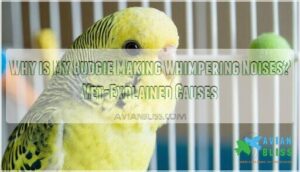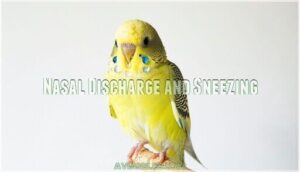This site is supported by our readers. We may earn a commission, at no cost to you, if you purchase through links.

The sound might seem subtle at first, but when paired with tail bobbing, labored breathing, or behavioral changes, it becomes a clear warning that something’s affecting your bird’s health. Understanding what triggers these noises helps you distinguish between harmless quirks and conditions that need immediate attention.
Table Of Contents
- Key Takeaways
- Why is My Budgie Making Whimpering Noises?
- Recognizing Respiratory Problems in Budgies
- Environmental Triggers for Abnormal Vocalizations
- Stress Factors That Cause Whimpering
- When to Seek Veterinary Care
- Frequently Asked Questions (FAQs)
- Why is my budgie making whining noises?
- Why is my bird making a whining sound?
- Why is my budgie making creaking noises?
- Why does my budgie make weird noises at night?
- How long can whimpering noises in budgies last?
- Can diet affect a budgies vocalizations?
- Are certain budgie breeds more prone to whimpering?
- Can whimpering be a sign of mating behavior?
- Do budgies make whimpering noises while sleeping?
- Can budgies whimper from digestive problems or upset stomach?
- Conclusion
Key Takeaways
- Whimpering in budgies often signals respiratory infections, physical pain, or environmental irritants—but it can also be normal beak grinding during sleep, which indicates contentment rather than distress.
- Watch for accompanying red flags like tail bobbing, labored breathing, nasal discharge, or open-mouth breathing, as these symptoms confirm serious respiratory disease requiring immediate veterinary attention.
- Environmental factors including poor air quality, temperature extremes, toxic fumes from nonstick cookware, and inadequate lighting can trigger stress-related whimpering and compromise your bird’s respiratory health.
- Social isolation, lack of mental stimulation, and vitamin A deficiency significantly increase the risk of behavioral disturbances and respiratory infections that manifest as abnormal vocalizations.
Why is My Budgie Making Whimpering Noises?
When your budgie makes unusual whimpering sounds, it’s natural to feel concerned—and rightly so, since these noises can signal anything from serious respiratory issues to perfectly normal sleep behavior.
The causes range widely, from airway constriction and environmental irritants to simple contentment grinding.
Let’s break down the four main reasons your budgie might be making these sounds so you can figure out what’s happening.
Respiratory Infections and Airway Constriction
Respiratory infections rank among the top reasons your budgie might make whimpering noises. When airways narrow due to conditions like air sacculitis or avian pneumonia, your bird struggles to breathe, producing those distressing sounds. Watch for these warning signs:
- Tail bobbing with each breath
- Labored breathing or open-mouth gasping
- Nasal discharge or sneezing fits
- Lethargy and fluffed-up feathers
- Reduced appetite or vocalization changes
Bacterial, fungal, and viral infections can all trigger airway obstruction, with respiratory diseases affecting 5–10% of annual vet visits. Understanding respiratory disease causes is vital for identifying the root of your budgie’s whimpering noises.
Pain or Physical Discomfort
Beyond infections, your budgie might whimper because something hurts—internal tumors, egg binding, injuries from cage accidents, or even arthritis in older birds can all trigger these soft distress calls. Physical trauma often goes unnoticed until whimpering noises emerge. Watch for limping, wing drooping, or reluctance to perch.
Respiratory infections aren’t always the culprit—veterinary care and regular health exams catch hidden problems before they worsen.
| Injury Signs | What to Watch For |
|---|---|
| Beak Problems | Overgrowth, cracks, bleeding |
| Feather Plucking | Bald patches, self-mutilation |
| Budgie Health Issues | Weight loss, posture changes |
| Pain Indicators | Avoiding movement, isolation |
Normal Beak Grinding During Sleep
Not every whimper signals trouble—sometimes your budgie is just settling in for the night with a soft, rhythmic beak grinding that sounds surprisingly like a tiny contented sigh.
This nocturnal behavior is your bird’s way of saying "I’m relaxed and safe." Think of it like purring in cats—beak grinding during restful sleep shows healthy sleep patterns and proper bird communication.
These whimpering noises don’t need intervention; they’re part of normal budgie care routines and pet bird behavior.
Environmental Irritants and Air Quality Issues
While beak grinding means all is well, the air your budgie breathes can silently turn those contented sounds into genuine distress calls. Toxic fumes from nonstick cookware, aerosol sprays, and cigarette smoke trigger whimpering noises by inflaming delicate respiratory tissues.
Dust exposure and poor ventilation issues create the perfect storm for air sac disease, while humidity extremes—too dry or too damp—leave your bird vulnerable to respiratory disease that announces itself through those worrying sounds.
Recognizing Respiratory Problems in Budgies
Respiratory issues are one of the most serious health concerns for budgies, and catching them early can make all the difference.
When your bird makes whimpering noises, it’s worth knowing what other symptoms might signal a breathing problem. Here’s what to watch for in your budgie.
Tail Bobbing and Labored Breathing
When your budgie’s tail bobs up and down with each breath, it’s one of the most telling signs that something’s wrong with their respiratory system. This labored breathing indicates your bird is working harder than normal to move air through compromised airways.
Tracheal problems, airway obstruction, or respiratory disease can all trigger this exaggerated tail movement, and you shouldn’t mistake it for normal beak grinding sounds. Immediate veterinary care is essential when you notice this symptom.
Nasal Discharge and Sneezing
A clear, runny discharge from your budgie’s nostrils—sometimes accompanied by crusty buildup around the cere—often points to an upper respiratory infection that needs attention. You’ll often notice sneezing alongside these nasal infections, which can stem from bacterial or fungal sinus issues affecting your bird’s respiratory health. Don’t ignore persistent discharge—it compromises breathing and signals declining wellness.
Key warning signs to watch for:
- Wet or matted feathers around the nostrils and face from constant discharge
- Frequent sneezing episodes that seem more intense than occasional dust reactions
- Crusty yellow or green buildup on the cere indicating bacterial infection
- Head shaking as your budgie tries to clear blocked nasal passages
Open Mouth Breathing
If you spot your budgie breathing with its beak wide open—especially when it’s not overheated or stressed—you’re witnessing a serious red flag that demands immediate veterinary attention. Open mouth breathing signals severe airway obstruction or late-stage respiratory disease that’s compromising your bird’s ability to get oxygen.
Normal breathing patterns in budgies rely on efficient beak function and clear airways, so whimpering noises paired with gaping indicate your bird’s struggling.
This breathing distress can also result from mouth injuries affecting avian health, making veterinary care essential.
Causes of Respiratory Disease
Respiratory infections in budgies stem from multiple interconnected causes that can quickly compromise avian health. Tracheal obstruction, pulmonary disease, and air sac disease represent the primary pathways to those concerning whimpering noises you’re hearing.
Upper respiratory tract infections often develop when environmental stressors—like poor air quality or humidity extremes—weaken your bird’s natural defenses, allowing bacteria, viruses, or fungi to invade. Internal tumors or organ enlargement can also create airway constriction that triggers respiratory distress.
Understanding respiratory health issues is vital for identifying the root cause of these symptoms.
Vitamin a Deficiency and Sinus Infections
Your budgie’s diet might be missing a vital nutrient that’s quietly setting the stage for chronic sinus trouble. Vitamin A deficiency weakens sinus linings, creating pathways for avian respiratory infections that manifest as whimpering noises and respiratory issues. When these membranes deteriorate, bacteria colonize easily, triggering sinus infections that affect beak health too.
Consider adding:
- Dark leafy greens (kale, spinach)
- Orange vegetables (carrots, sweet potato)
- Quality pellets fortified with Vitamin A
- Vet-approved nutrient supplements when deficiency is confirmed
Environmental Triggers for Abnormal Vocalizations
Your budgie’s environment plays a bigger role in their vocalizations than most owners realize. Temperature swings, stale air, chemical fumes, and even lighting problems can all trigger stress-related sounds that mimic illness.
Let’s look at the most common environmental culprits that might be causing those unsettling whimpers.
Temperature and Humidity Extremes
Think of your budgie’s comfort zone as surprisingly narrow—just like Goldilocks, they need everything "just right," and humidity levels outside the 40-70% range or temperatures below 65°F or above 80°F can stress their delicate respiratory system enough to trigger unusual sounds.
When climate effects push budgie birds beyond this ideal range, environmental stress compounds quickly, leaving airways irritated and vulnerable to respiratory disease.
That’s why temperature control and proper humidity levels matter so much for avian health and wellness—your veterinary care for budgies should include monitoring these conditions to prevent whimpering noises before they start.
Ammonia Toxicosis and Aerosol Pollutants
Beyond climate concerns lies an invisible threat: ammonia exposure from droppings accumulates fast in poorly maintained cages, and levels above 25 ppm damage tracheal cilia—the tiny "sweepers" protecting airways from infection.
Aerosol pollution adds insult to injury:
- Cooking fumes and perfumes irritate already vulnerable sinuses
- Toxic air weakens immune defenses, doubling infection rates
- Chemical cleaners near cages trigger respiratory damage
These environmental assaults explain many cases of whimpering noises and air sac disease I see during veterinary care for budgies—avian health depends on clean air you can’t always see or smell.
Poor Air Quality and Ventilation
Stale air trapped in small spaces doesn’t just smell bad—it starves your budgie’s respiratory system of oxygen while concentrating the very pollutants that trigger those worrying whimpering sounds.
Ventilation systems matter more than most owners realize—proper air purification reduces indoor pollution that causes avian respiratory infections.
I recommend air quality monitoring near your bird’s cage, because even subtle drops in respiratory health can escalate into serious respiratory disease or air sac disease before you notice other symptoms.
Sudden Changes in Surroundings
Moving your budgie’s cage across the room or rearranging furniture nearby might seem harmless, but these shifts can trigger stress-related whimpering that mimics respiratory distress. Environmental stress from cage rearrangement or owner absence disrupts your budgie’s sense of security, while social changes like new pets intensify anxiety. Noise pollution compounds the problem, making your pet bird feel vulnerable.
Common triggers include:
- Relocating the cage to unfamiliar rooms with different lighting or sounds
- Introducing new household members or pets without gradual acclimation
- Sudden changes in daily routines that disrupt feeding or interaction schedules
Inadequate Lighting and Sleep Disruption
Just as a shuffled room can unsettle your budgie, poor lighting cycles throw off their internal clock and turn nighttime into a stress fest that produces anxious whimpering. Budgie birds need 10-12 hours of darkness for healthy sleep patterns, yet inconsistent lighting disrupts circadian rhythms and triggers whimpering noises. Veterinarians recommend full-spectrum UV lights on timers to stabilize light cycle impact on bird behavior.
| Lighting Issue | Effect on Budgie | Lighting Solutions |
|---|---|---|
| 24-hour bright light | Sleep deprivation, stress vocalizations | Timer-controlled lights (12hr on/off) |
| Inconsistent schedules | Disrupted circadian rhythms, anxiety | Maintain fixed daily light cycle |
| No UV exposure | Behavioral changes, health decline | Full-spectrum UV bulbs for cage |
Stress Factors That Cause Whimpering
Budgies are social creatures who depend on routine, interaction, and a sense of security to thrive. When these needs aren’t met, stress builds up and can manifest through unusual vocalizations like whimpering.
Let’s look at the specific stress factors that might be affecting your bird.
Social Isolation and Loneliness
Budgie birds are deeply social creatures, and isolation can quietly unravel their emotional well-being. When kept alone without adequate companionship or human interaction, budgies often develop distress behaviors—including whimpering vocalizations—that signal loneliness and psychological strain.
Research shows isolation takes a serious toll on pet bird behavior and training outcomes:
- Over 70% of solo budgies develop behavioral disturbances like feather plucking or excessive screaming within their first year alone
- Distress calls increase markedly in single-housed birds compared to those with companions, reflecting their desperate need for social bonding
- Lethargy appears in 80% of isolated budgies within six months, alongside reduced normal vocalizations and play
- Depression-like symptoms emerge when companion needs go unmet, with isolation identified as a primary risk factor
- Providing a budgie companion reduces depression risk by at least 40%, while several hours of daily human interaction offers emotional support
If care considerations or living situations prevent adding another bird, commit to extended daily socialization. Your budgie’s whimpering may be their way of telling you they need connection—and addressing isolation effects can restore their cheerful, thriving nature.
Lack of Mental Stimulation
Boredom isn’t just an inconvenience for budgies—it’s a genuine welfare concern that can trigger anxiety-driven vocalizations like whimpering.
Without cognitive stimulation through toy rotation, environmental enrichment, and social interaction, your budgie’s mental exercise needs go unmet. This deprivation manifests as distress behaviors, including unusual whimpering noises.
Providing varied activities and regular socialization meets this fundamental bird behavior need.
Overcrowding or Cage Aggression
When multiple budgies share limited space—or when territorial disputes flare up—whimpering can signal social stress and feelings of being trapped or threatened.
Cage size matters more than you might think: overcrowding disrupts natural flock dynamics and bird socialization, leading to aggression signs like pecking, feather plucking, and distress vocalizations.
Meeting proper space requirements for your budgie—and observing avian behavior cues—helps prevent these bird behavior problems before they escalate.
Insufficient Human Interaction
Your budgie isn’t just another pretty face in a cage—these social creatures crave meaningful interaction with you, and without it, those soft whimpers often reveal a lonely heart crying out for connection.
Daily playtime activities and consistent tactful management considerations strengthen social bonding and provide essential emotional support.
Without regular companionship and interaction techniques like gentle talking or training sessions, your budgie experiences genuine distress—behavioral enrichment through meaningful social interactions isn’t optional, it’s absolutely essential for their psychological well-being.
Hormonal Changes and Breeding Behavior
Hormonal surges during breeding season can transform even the most laid-back budgie into a restless ball of energy. Those soft whimpering sounds often signal their body is revving up for reproduction, whether you’ve planned for it or not.
You’ll notice increased courtship displays, nesting behavior like shredding paper, and mating rituals that accompany these breeding cycles. Hormone regulation naturally fluctuates, but if whimpering noises persist alongside behavioral changes, a veterinary exam helps rule out underlying issues beyond normal hormonal changes in your budgie.
When to Seek Veterinary Care
Knowing when your budgie needs professional help can make all the difference in catching problems early. Some symptoms clear up on their own, but others signal serious conditions that won’t improve without treatment.
Here’s what should prompt you to pick up the phone and call an avian vet.
Persistent or Worsening Symptoms
If those soft whimpering sounds don’t fade after a good night’s sleep or seem to be getting worse each day, it’s time to pay closer attention. Persistent whimpering noises often signal underlying budgie health problems like respiratory issues, chronic pain, or beak problems that won’t resolve on their own.
Behavioral changes paired with worsening respiratory disease need a veterinary exam—an avian veterinarian can pinpoint whether it’s feather conditions or something more serious.
Accompanying Physical Warning Signs
Beyond the whimpering itself, watch for physical red flags like tail bobbing, fluffed-up feathers that won’t smooth down, or discharge around the nostrils—these visible symptoms often confirm that something’s genuinely wrong with your bird’s health.
Other warning signs include:
- Open-mouth breathing or labored respiration suggesting respiratory issues
- Feather plucking or wing injuries that appear suddenly
- Eye infections with crusty discharge or swelling around the eyes
These physical symptoms alongside whimpering noises warrant immediate veterinary advice to address potential beak problems or respiratory disease.
Changes in Appetite or Behavior
A budgie who suddenly turns her nose up at millet or sits quietly in the corner instead of chirping at you is often telling you something’s off before the whimpering even starts. These appetite changes and behavioral shifts matter because birds hide illness instinctively—by the time you notice lethargy or food preferences shifting dramatically, you’re seeing real trouble.
| Normal Behavior | Warning Signs |
|---|---|
| Active chirping and social interaction | Social withdrawal, sitting fluffed and silent |
| Enthusiastic eating at regular times | Refusing favorite foods, ignoring millet |
| Playful hopping and climbing | Lethargy, staying on cage floor |
| Consistent daily routine | Mood swings, sudden aggression or fear |
| Normal droppings and grooming | Soiled feathers, changes in waste appearance |
When budgie health problems show up as behavior changes alongside whimpering noises, contact an avian specialist—bird behavior rarely lies, and early veterinary advice can be lifesaving.
Emergency Symptoms Requiring Immediate Attention
Some budgie emergencies demand action within minutes, not hours. Severe respiratory distress—open-mouth breathing, persistent tail bobbing, or audible wheezing—indicates life-threatening airway constriction, and whimpering noises may signal late-stage respiratory disease.
Uncontrollable bleeding, seizures, or paralysis (central nervous system crisis), systemic collapse with fluffed feathers and cold legs, or severe trauma like fractures all require immediate transport to an avian specialist. Birds can decline rapidly, and common illnesses in budgies escalate without warning.
Importance of Annual Avian Vet Checkups
Preventing emergencies starts long before symptoms appear—regular wellness exams catch silent threats like tumors, vitamin deficiencies, and early-stage infections that budgies instinctively hide until it’s almost too late. Your avian specialist can detect subtle changes during annual checkups that you’d never notice at home—weight loss, heart murmurs, or early respiratory compromise.
Veterinarians recommend scheduling these visits even when your budgie seems perfectly healthy, because preventative measures and early veterinary guidance dramatically improve outcomes and can add years to your bird’s life.
Frequently Asked Questions (FAQs)
Why is my budgie making whining noises?
Whining sounds from your budgie aren’t always cause for alarm—sometimes it’s just peaceful beak grinding during sleep, a sign your bird feels safe and content.
However, respiratory infections, physical discomfort, or environmental irritants can also trigger these vocalizations, so understanding the context matters.
Why is my bird making a whining sound?
Birds whine when they’re struggling with respiratory infections, experiencing discomfort, or reacting to environmental irritants affecting their airway health.
Bird behavior shifts noticeably during illness, making vocal training and close observation essential for beak health and feather care alongside proper nutrition advice.
Why is my budgie making creaking noises?
Like a rusty door hinge in the stillness of night, creaking sounds in budgies often stem from Beak Grinding during Sleep Behavior—a sign of contentment, not distress.
Unlike whimpering noises linked to respiratory disease or noise pollution, these normal Vocalization Patterns signal relaxation.
Why does my budgie make weird noises at night?
Most budgies make soft sounds at night from beak grinding—a sign they’re relaxed and drifting into deeper sleep patterns.
It’s their version of contentment, showing your parakeet feels safe through natural nocturnal behavior and healthy sleep patterns.
How long can whimpering noises in budgies last?
Last year, one of my clients watched her budgie whimper for three straight nights before bringing him in—turned out to be a sinus infection.
One client’s budgie whimpered three nights straight before a vet visit revealed a treatable sinus infection
Normal beak grinding during sleep cycles usually lasts 5-15 minutes per session and signals contentment, but persistent whimpering noises beyond this timeframe warrant veterinary attention since budgie health problems and avian respiratory infections don’t resolve themselves.
Can diet affect a budgies vocalizations?
Yes—nutrient deficiency and poor dietary balance directly impact vocal health in budgies. Vitamin A deficiency weakens respiratory tissues, while inadequate fruits and vegetables limit beak care nutrients, potentially affecting sound production and overall budgie health problems.
Are certain budgie breeds more prone to whimpering?
There’s no true breed variation in budgies—they’re all one species. English budgies and Australian budgies share identical respiratory anatomy and vocalization patterns.
Whimpering noises stem from health problems, environmental irritants, or beak grinding, not genetics or breed variations.
Can whimpering be a sign of mating behavior?
Hormonal changes during breeding cycles don’t usually cause whimpering noises in budgies. Instead, mating behavior involves chirping, head-bobbing, feeding gestures, and increased social bonding.
Whimpering usually signals health problems requiring veterinary attention.
Do budgies make whimpering noises while sleeping?
It’s perfectly normal—those soft whimpering sounds during sleep are actually beak grinding, a sign your budgie feels safe and content.
This nocturnal behavior signals restful sleep, similar to how humans might sigh peacefully while dreaming.
Can budgies whimper from digestive problems or upset stomach?
Digestive problems don’t usually cause whimpering noises in budgies. Gut Problems and Stomach Issues usually show up as fluffed feathers, lethargy, abnormal Bowel Movements, or sitting at the cage bottom—not vocalizations.
Conclusion
That whimper cutting through your budgie’s usual chatter is like a smoke alarm you can’t ignore—it’s your bird’s way of saying something’s off. Whether it’s a respiratory infection tightening their airways, environmental irritants fouling the air, or stress overwhelming their tiny frame, a budgie making whimpering noises deserves your immediate attention.
Watch for tail bobbing, breathing changes, or behavioral shifts, and don’t hesitate to call your avian vet when symptoms persist. Your quick response could mean the difference between a minor issue and a serious health crisis.
- https://ssl.acesag.auburn.edu/dept/poultryventilation/documents/Nwsltr-19-Ammonia.pdf
- https://www.alltech.com/blog/how-control-ammonia-levels-poultry-houses
- https://www.poultrytrends.in/impact-of-ammonia-and-humidity-on-poultry/
- https://pubmed.ncbi.nlm.nih.gov/36083210/
- https://birdsupplies.com/blogs/news/149260295-bird-breathing-problems











